Mere minutes after my return to Amman from Ajloun and Um Qais as documented in my previous post, I went to bed. I knew I would need the extra sleep in order to wake up at 3:30 in the morning to prepare for the Easter morning church service on Mount Nebo. I had invited my friend Mika several weeks ago, and she in turn invited along two of her friends, David and Bart. You’d think that the dark streets of the old part of Amman would be fairly quiet at 4:30 in the morning when we started walking to the church near 1st circle, but then you remember that the morning call-to-prayer has just gone off like clockwork as it always does at this time in the morning. The streets weren’t full, to be sure, but there were definitely about a dozen men in the street, usually wearing the long, flowing robes common among sheikhs. I was a little worried that we wouldn’t make it in time, but the two buses were waiting, idling softly in an alleyway. I almost missed them but Mika must have been slightly more awake then me and pointed them out.
The rest of the bus seemed semi conscious, or maybe they were just doing better jobs of voice modulation than we were. In any case, I felt that those extra 4 hours of sleep worked miracles and I made it all the way to the mountain without passing out in my seat. The sun was just beginning to rise, giving the world a blue-gray tint as we walked up the stone path to the meeting room on the summit. I had seen the same room a month ago with Christine when it had been a mosaic viewing room, but now the place was already packed with people, standing room only, all the way to the doors. Mika got a seat, and us three guys took turns rotating around limited standing room at the back of the chapel. I leaned against a veiled electronic keyboard and almost knocked it over, or that is, it would have fallen had there have been any place for it to land that wasn’t already occupied.
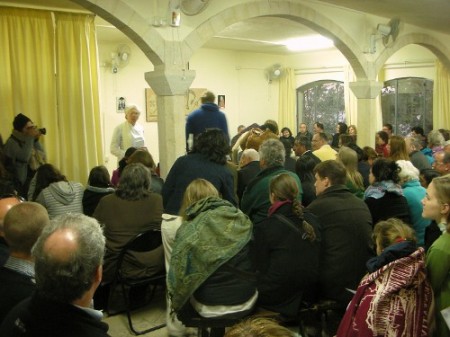
Pastor Lex can draw a crowd for his service: standing room only!
I’ve found that Pastor Lex’s sermons are a very interesting blend of Biblical lessons and historical storytelling, some of the most interesting I’ve heard. In my youth, my old Lutheran church had fiery sermons about life messages, but Lex provides a new spin on things, in my opinion, by providing the larger geopolitical context that surrounded the actions of the disciples, Jesus, and the leaders of the Jewish people. During the communion I was excited by the thought that our 150-person congregation would go outside and enjoy the morning sunshine, and indeed figured we’d have to because of the difficulty of moving around in the tiny room, but to no avail; Lex was able to maneuver us successfully without sending us out into the wind. The windows on the far side of the room were an accurate gauge of the wind speeds – judging from the pine trees waving frantically like flags, it may have been better that we were all huddled in there.
Mika had originally proposed a plan of having an Easter brunch with our guests, of the kind that us Midwesterners like to have on Easter at 10:30 or so, involving ham, eggs, and buttered rolls. Ham…even the thought of sweet, delicious, hard-to-find pork products here in Jordan was enough for me to sign onto anything she suggested. But, as David and Bart pointed out, they had rented a car for their travels a day before, and it was a shame for a group of foreigners to have access to a car and not make use of it. So it was decided that we would visit Jerash, then come back and have a dinner of some kind. This day was shaping up to be a more leisurely, less frenetic version of the day last month that Christine went to Madaba, Nebo, Jesus’ Baptism site, and then Jerash. Jerash had been closed then, but I knew that since it was only 10 there was no chance that I would miss it a second time!
The largest and most impressive ruin in the site is the Temple of Artemis, who was more than likely the patron goddess of the ancient city. David, who had visited Jerash before and had a guide, knew some special things about it. Or, to be more specific, he knew a guy who knew a guy who had paid for a guide here once before, so it was almost like we were receiving first-hand knowledge. Almost. He led us over past a gesturing vendor who had set up shop inside the temple itself, over to a column on the south wall. Curiously enough, the column had a spoon and a pebble wedged underneath its bulk, which David told us to take a close look at. We peered at it…and saw that it was moving. I squinted back up at this massive column again, which undoubtedly weighed at least 6-7 tons. The spoon though, was clearly waving up and down, a sign that the column was swaying in the breeze. We all laughed (nervously, perhaps) and backed away from it. Sure, it may have been standing for several thousand years, but no one wanted to tempt fate.
We explored the entire Temple of Artemis before moving on, all the way from the very bottom in a series of underground passageways, accessible by a otherwise unnoticeable door in the base of the alter. There were no lights down there, and some very odd smells in certain parts of it. Light filtered down on us from above from chinks in the stone, making me wonder nervously again how strong the floor was above us. I had a feeling that if a giant tourist group came in all at the same moment (as pictured above) we might run into trouble, trouble like the floor collapsing on top of us. Apparently, enough moisture had gotten down here during the recent rainy season that there were little plants and moss sprouting all over in the cool darkness, and with a little light balance change on my camera, I was able to capture the green glow in the air.
It was at the Temple that we met Rachael, a young woman from Australia traveling through the Holy Land with her brother, who had left for the day to go to Syria. Rachael heard us talking about the tilting pillar and assumed that perhaps we were a guided tour (David laughed at this) but of course, journeys are always better with new friends, so she joined our little group soon afterward for the rest of our explorations. I recall in Britain two summers ago, meeting a Korean student studying in Liverpool, and thinking how cool it must be to be a foreigner working or living in a foreign country – now, years later, the four us of were happy to show traveler around our “home” here in Jordan with the pride that only pseudo-natives like ourselves can have.
Rachael probably assumed that we were all normal, well-adjusted people, but of course I had to prove her wrong within ten minutes in the North Theatre, where I was goaded, no – forced! into singing and dancing onstage for the amusement of an Arab family that was sitting in the seats, relaxing. It started when we saw the young son, probably 16 or 17, dancing on the stage for his parents, just goofing around. The five us applauded and cheered for him, and he bowed gracefully. However, when Bart and I explored the stage, the young man and his parents and sisters called down to us, “now it’s your turn! Dance some American dances!” Bart and I gave each other sheepish looks; what could possibly compare in energy with debka? We did a demonstration of “white men dancing,” and probably embarrassed the entire race doing it, but then when I started a kickline (I can’t stop doing kicklines; I blame show choir) we drew applause from the entire theatre. Of course, that just got me started and I proceeded to first sing “Mr. Cellophane” from the Chicago musical, and then I even tried to sing as much of Zahret al-Mada’en melody as my knowledge of the bass line allowed. I’m sure I would have gotten at least a few gongs before the giant cane hooked me offstage, but I couldn’t have asked for a better venue.
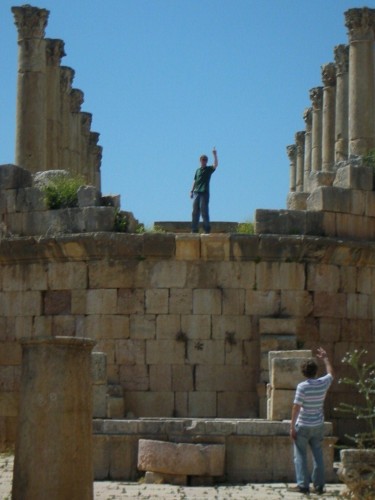
"Thank you for coming out here tonight. No, seriously, you're a great audience. I'll be in town all week."
Now that I had been put into the theatre mood, it was hard to snap out of it right away. Bart led me over to a pile of rocks that we hadn’t stopped by yet, and pointed out a courtyard and a high place that announcements and speeches could be given from. “Now, you can act like an emperor and have your minions spread out in front of you.” I was more than happy to take him up on his offer, posing, saluting and giving my “THIS, IS, SPARTA!” speech, with some modifications. Rachael probably thought that the two of us, especially me, were totally nuts by now, but she willing obliged to take pictures for us.
Right before we left, we stopped briefly by the South Theatre, which like Um Qais is the larger of the two in the city. I may have mentioned this before, but Jordanians, especially Bedouins, have a certain odd affinity to the bagpipes. They’re played at weddings without fail and you can always hear them somewhere in the city. In this case, we walked into the theatre at the same time as a group of Spanish tourists, and two chubby Bedouins, decked out in military gear and keffiyeh, started up a bagpipe and drum rhythm for about 10 minutes as the delighted tourists danced in the hot sun. An elderly Hispanic gentleman with long white hair in a ponytail climbed up onto the stage and started reciting what could have been Shakespeare, in Spanish. I only recognized a few words, but it was definitely recognizable for what it was.
Since Rachael had come up alone on the bus, we offered to give her a ride back to Amman and join us for dinner. Although I was looking forward to ham sandwiches, or steaks, or something involving ham, the others suggested that since Rachael was only in the country for another day, she should have something specially Arab – Jordanian specifically – for dinner. David and Bart exchanged glances, and Mika asked me, “Well, there’s this restaurant that the two of them went to recently; I’d like to try it.” Rachael and I asked what it was, and Mika said simply: “Sheep brains.”
Oh. Sheep brains. She said it as casually as if they’d suggested ice cream cones.
WARNING: DO NOT READ THE REST OF THIS ARTICLE IF YOU ARE ABOUT TO EAT, OR ARE PLANNING ON EATING EVER AGAIN. DO NOT OPERATE HEAVY MACHINERY OR ATTEMPT TO SLEEP WITHIN 3 HOURS OF READING THIS ARTICLE.
That meant that ham was out. I kept my whimpering to a minimum, and obediently followed the group to a relatively normal-looking restaurant named Abu Musa (Father of Moses) near the edge of the downtown, only a few blocks down the mountain from Jebel Amman. I say “relatively normal” because most restaurants that I know don’t proudly display stomachs, sliced open heads, tongues, and brains on silver trays in their front windows. I tried not to make eye contact with the blankly staring sheep eyes, and focused instead on the pictures of happy, smiling sheep adorning the walls. How gruesomely ironic, I thought.
David and Bart ordered everything for us with great gusto, clearly enjoying our reactions. I felt fairly brave as we were ordering, even though David’s comment of “How many eyeballs would you like?” was definitely unnerving. The appetizers, simple vegetables, fatteh hoummus with bread, and broth arrived first and put me an even more confident state of mind. How could any place that served such tasty fatteh possibly be bad, I thought? Then the main course arrived; all of the goodies of a sheep on neat little plates, arranged artistically for us. We had grilled hooves, stomachs and intestines stuffed with rice, a brain on a plate, and of course the crowned main course (pun intended), half of a sheep’s head, including tongue, cheek meat, and one eyeball. “Dig in,” we were commanded. And so…I tried to.
I figured I might as well get a taste of the brains first, before Bart finished them off all by himself: “I love brains!” I quoted him. I took a slice of the ever-present Arabic bread, reached forward, and gently prodded the veined white mass, which wiggled gelatinously at me, like it was saying hello. Stop anthropomorphizing this brain, I commanded myself. Don’t think of encephalitis, either. I’m sure they cooked this properly. Then, before I could come up with more excuses, I pushed the bread through the frontal lobe, held the little pile in my hand momentarily, and popped it into my mouth.
Bart and David watched me. “It’s kind of like hard-boiled eggs,” Bart commented helpfully. “I don’t like hard-boiled eggs,” I retorted through my mouthful of brain. He was right though, they did taste like eggs that had been left in the sun for a little while and turned slightly sour. The texture was firm yet chewy, and if I hadn’t seen the skull where this brain had come from right next to me and had been blindfolded, I really would have just thought they were old eggs. However, as I swallowed my brainy treat, I decided to move on and try something else.
I sampled the rice-filled intestines, which were probably the most normal thing on the table – what’s a sausage, after all, but intestines with more meat stuff inside them? No problems there; they were a little chewier than normal, but completely passable. The hooves were sampled next, but as they were pretty much boiled/grilled keratin and cartilage, I decided that the lack of flavor was probably good enough reason to put that down as well. Meanwhile, David and Mika were tearing away at the half-faced sheep head. I’ve never seen what the inside of a herbivore’s cheek looked like, but I did recall from biology class that they had special rough edges in their cheeks to grind grass down. I saw it, but didn’t sample it as it looked too much like sandpaper to be appealing. Perhaps most disconcerting was how much it still looked like a sheep, even without hair and skin.
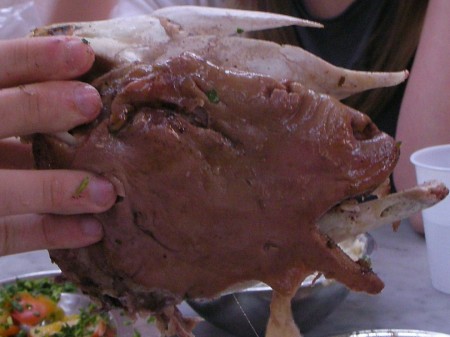
The white part behind the purple-colored head is bones of the skull and jaw, which the well-cooked meat is literally falling from
Bart, who had demolished the rest of the brain in a zombie-like fashion, was examining the stomach, trying to figure out how to get into it. As it was closest to me, I pulled on a bit of white sinew on it, but realized that it was a string that had been used to re-sew the yellowish sack shut after it had been stuffed with rice and other tasty bits. Bart hesitated for just a moment, asking how we were supposed to eat it with a string on it, then just shrugged and answered his own question by biting directly into it. As I was sitting across the table from him, I watched the rubbery flesh stretch, then stringily disintegrate into little shreds around his mouth. Bart had a weird look on his face when he came up for air, and he passed it around the table. Oddly enough, David declined the offer, saying, “That’s actually the one thing here I don’t like,” which made me feel very nervous all of a sudden. When it came to me at last, I took a bite. A deep feeling of nausea overcame me, and I swallowed quickly without chewing (Even as I’m typing this, I just shuddered a little bit at that memory). It tasted like…well, I won’t be overly graphic (too late, you say) but it tasted like how you’d expect the inside of a large intestine to taste. Enough said on that subject. No one touched the stomach again.
Soon all that was left was the eyeball, which David swiftly yanked out of the eye socket and waved in front of us cheerfully. Any bravery that I had ever had while dining evaporated and I suddenly found myself praying for the khamseen weather to suddenly destroy the building and all of us inside, and this dreaded eyeball. “There’s…there’s no pupil on it,” I stammered, poking at it its now-cold surface and the trailing optic nerve which draped festively over the side of the plate. “That’s because they boiled it, and then it exploded,” David chimed in, staring hungrily at the ball of flesh. I guess you could say that he was making eye contact. Rachael both politely declined a taste, even as David offered to cut it up for us all to try. I turned away from a moment to look at the waiter, grinning broadly at us from the next room – when I looked back, the eye was gone, and David had a contented look on his face. “There’s a bit of the optic nerve yet, if you want it,” he offered. “Check please,” I replied.
The total for our feast? A mere seven and a half dinars, which for 5 people is essentially nothing. I tried not to look at anything else as we left the building. Although up and until this point, I’ve considered myself completely open-minded about everything here in Jordan, but at that moment I needed to be as far from sheep offal as possible. Couldn’t make eye contact. Har har.
David and Mika left soon afterward, which left Bart and Rachael with me, lured by my invitation to Al-Borij for argeilleh. Like so many other Americans and even Jordanians, Bart had labored under the allusion that a 3JD argeilleh was the cheapest he was goigng to be able to find without going out to Jebel Nadeef and smoking out of a moldy coconut shell, but I proved him otherwise with the fine service, delicious cocktails and numerous argeillehs available at Al-Borij for only a dinar. The three of us sat for two or three hours discussing (what else?) politics and life in Jordan – both for Jordanian friends that we knew and ourselves. Rachael admitted to knowing almost nothing about the Arab world, so Bart and I offered our own opinions from our differing backgrounds – his from his few months at the university on the other side of town, learning classical (fu7sa) Arabic, and my own from learning 3meea (public) Arabic while teaching refugees. We agreed on most things, although Bart had to roll his eyes when I got a few of the patrons across the sidewalk from us to take sides on which was more useful, fu7sa or 3meea. Personally, I will stick by my decision to learn solely 3meea, for the time being, because it’s what I need to exist easily in Jordan, and I don’t see myself spending long amounts of time in the other parts of the Arab world, just visits. Enough words are the same between the dialects that even then, I wouldn’t be too worried.
At about 10:30, the I parted ways from the others, knowing that I had class the next day. There are only a few days left of class now – just two for me, in fact! We’ve started the final exam portion of class where I have my students work in pairs and then perform a one-on-one exhibition of skill for me to grade them on. As it’s now 3 in the morning now and I have the weekly bike ride in just 5 hours, I should try to catch up on sleep now myself. I’d like to apologize again if you actually did plan on eating at some point in the future, but after all, I did warn you.
Or maybe, you’ve actually become totally interested in eating sheep brains now after reading this, in which case I can only say Ahalan wa Sahalan (Welcome and Comfort) to you because Abu Musa is sure to have just what you’re looking for. Just follow the smell of old eggs.
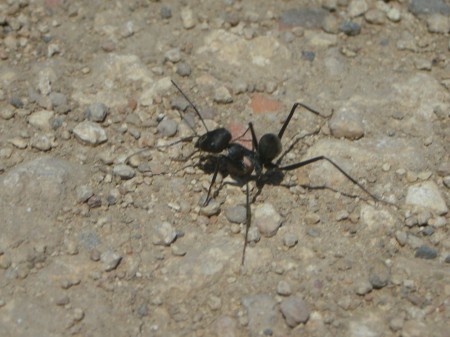
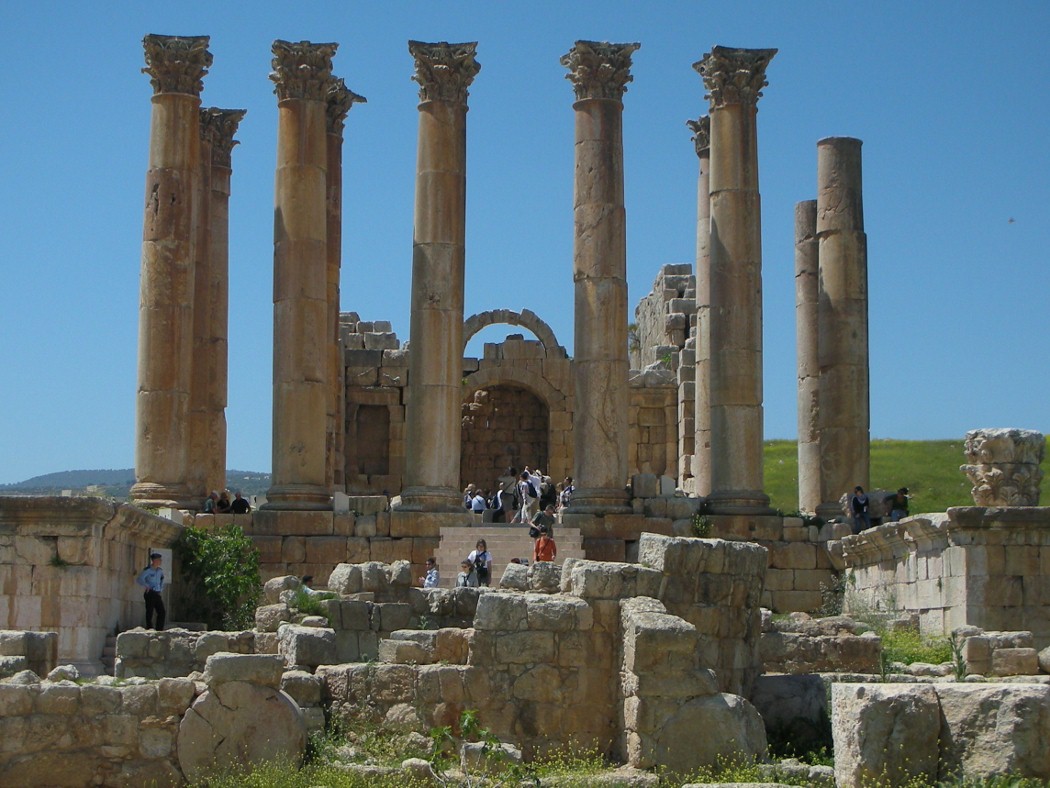
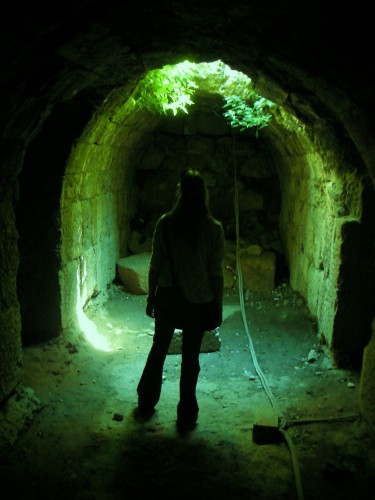
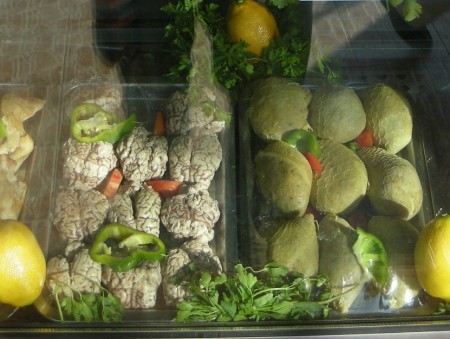


Reminds me of the sheep’s head we shared with neighbors at their home a few years back on New Year’s Eve. Abu Tulip was more daring. As I already had morning sickness I stuck to the waraq dawaali (rolled grape leaves) auntie had prepared as a side dish.
Do you think your ant-loving friend could explain what all these minuscule ants are doing in my bathroom? Do they eat shampoo? Cleaning and disinfecting is not doing the trick.
Wow! What a trip. What a fascinating experience you’ve had. Thanks for the retelling.
Probably just as well you stuck to sheep parts for your Easter dinner — after your performances in Jerash, it would have been cannibalistic for you to eat ham!
Wow you have a way with words and describing things. Not going to say I enjoyed it, haha. Too bad Mom is cooking me a nice dinner tonight; we’ll see how it goes down. Ugh, disgusting…